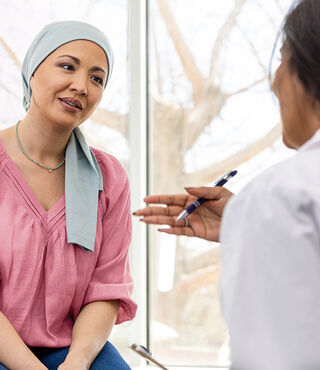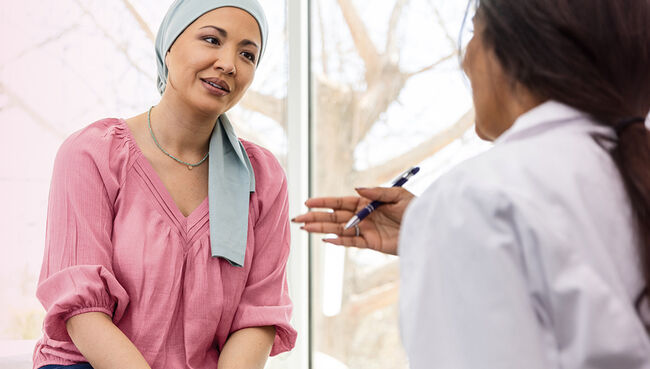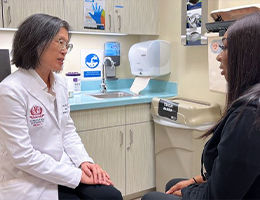We’re Stronger Together
With your help, we can make ambitious innovations in clinical care and education for our community.
Our breast cancer care team brings together unique expertise, sensitivity and state-of-the-art diagnostic tools for women's breast health. Our dedicated breast health experts, reconstructive surgeons, oncologists, nurses and staff are committed to treating your breast cancer and preserving healthy tissue.
At the Breast Health Center, we strive to provide whole person care. Unlike most centers, we add the spiritual, emotional and nutritional aspects of care into your treatment. We are with you every step of the way.
 Breast cancer
is the second leading cause of cancer death in women
Breast cancer
is the second leading cause of cancer death in women
3.8M breast cancer survivors in the US
13% Average risk of a woman in the US developing breast cancer
We treat all cancerous and benign conditions of the breast.
Most visits begin with a surgical oncologist consultation at the Women's Cancer and Surgical Oncology Clinic. Surgical oncologists are experts at diagnosing breast cancer, and seeing one doesn't necessarily mean you have cancer or need surgery. View a list of helpful questions to ask your surgeon.
Our Women's Imaging Center has the latest screening technology for breast cancer. The most common tests for diagnosing breast cancer are imaging tests and biopsies, including:
Staging is the process of testing how far breast cancer has spread in your body. Accurate staging is very important because each stage of breast cancer may require specific types of treatment. Our team has the experience needed to determine which of the following stages your breast cancer is in:
After your testing, a multi-disciplinary breast cancer team reviews the results to build your custom treatment plan. This team includes surgical, medical and radiation oncologists as well as pathologists and psychologists.
Your breast cancer treatment plan will be tailored to your unique needs. We'll help you understand your options, like the differences between chemotherapy and radiation therapy. Your plan may include a number of different types of treatment, including:
If you need breast cancer surgery, our surgeons will explain how the procedure works and its possible outcomes. Our breast cancer surgeons are experts in both standard procedures and the latest techniques and technologies, including:
When you're in our care, our priority is caring for the whole you. We focus on providing compassionate care for every aspect of your life impacted by cancer. You'll find a fully supportive environment with access to a wide range of resources, including:
Early detection saves lives. The earlier breast cancer is found, the easier it is to treat and cure. Learn a little bit about screening below or visit our screening page for a complete picture of the process.
If you're of average risk, regular screenings should start at age 40. If you’re at higher risk (family history/genetic factors), you may need to start earlier. Talk to your doctor about what’s right for you.


Scheduling a screening is a small act of self-care that can make a big difference. View the screening process or make an appointment today.
View Screening Process Make an Appointment
If you're concerned about breast cancer, we're here for you. To schedule a consultation with a breast cancer specialist, please call 800-78-CANCER or request more information.



 Breast cancer
is the second leading cause of cancer death in women
Breast cancer
is the second leading cause of cancer death in women
3.8M breast cancer survivors in the US
13% Average risk of a woman in the US developing breast cancer
We treat all cancerous and benign conditions of the breast.
Most visits begin with a surgical oncologist consultation at the Women's Cancer and Surgical Oncology Clinic. Surgical oncologists are experts at diagnosing breast cancer, and seeing one doesn't necessarily mean you have cancer or need surgery. View a list of helpful questions to ask your surgeon.
Our Women's Imaging Center has the latest screening technology for breast cancer. The most common tests for diagnosing breast cancer are imaging tests and biopsies, including:
Staging is the process of testing how far breast cancer has spread in your body. Accurate staging is very important because each stage of breast cancer may require specific types of treatment. Our team has the experience needed to determine which of the following stages your breast cancer is in:
After your testing, a multi-disciplinary breast cancer team reviews the results to build your custom treatment plan. This team includes surgical, medical and radiation oncologists as well as pathologists and psychologists.
Your breast cancer treatment plan will be tailored to your unique needs. We'll help you understand your options, like the differences between chemotherapy and radiation therapy. Your plan may include a number of different types of treatment, including:
If you need breast cancer surgery, our surgeons will explain how the procedure works and its possible outcomes. Our breast cancer surgeons are experts in both standard procedures and the latest techniques and technologies, including:
When you're in our care, our priority is caring for the whole you. We focus on providing compassionate care for every aspect of your life impacted by cancer. You'll find a fully supportive environment with access to a wide range of resources, including:
Early detection saves lives. The earlier breast cancer is found, the easier it is to treat and cure. Learn a little bit about screening below or visit our screening page for a complete picture of the process.
If you're of average risk, regular screenings should start at age 40. If you’re at higher risk (family history/genetic factors), you may need to start earlier. Talk to your doctor about what’s right for you.


Scheduling a screening is a small act of self-care that can make a big difference. View the screening process or make an appointment today.
View Screening Process Make an Appointment
If you're concerned about breast cancer, we're here for you. To schedule a consultation with a breast cancer specialist, please call 800-78-CANCER or request more information.



With your help, we can make ambitious innovations in clinical care and education for our community.